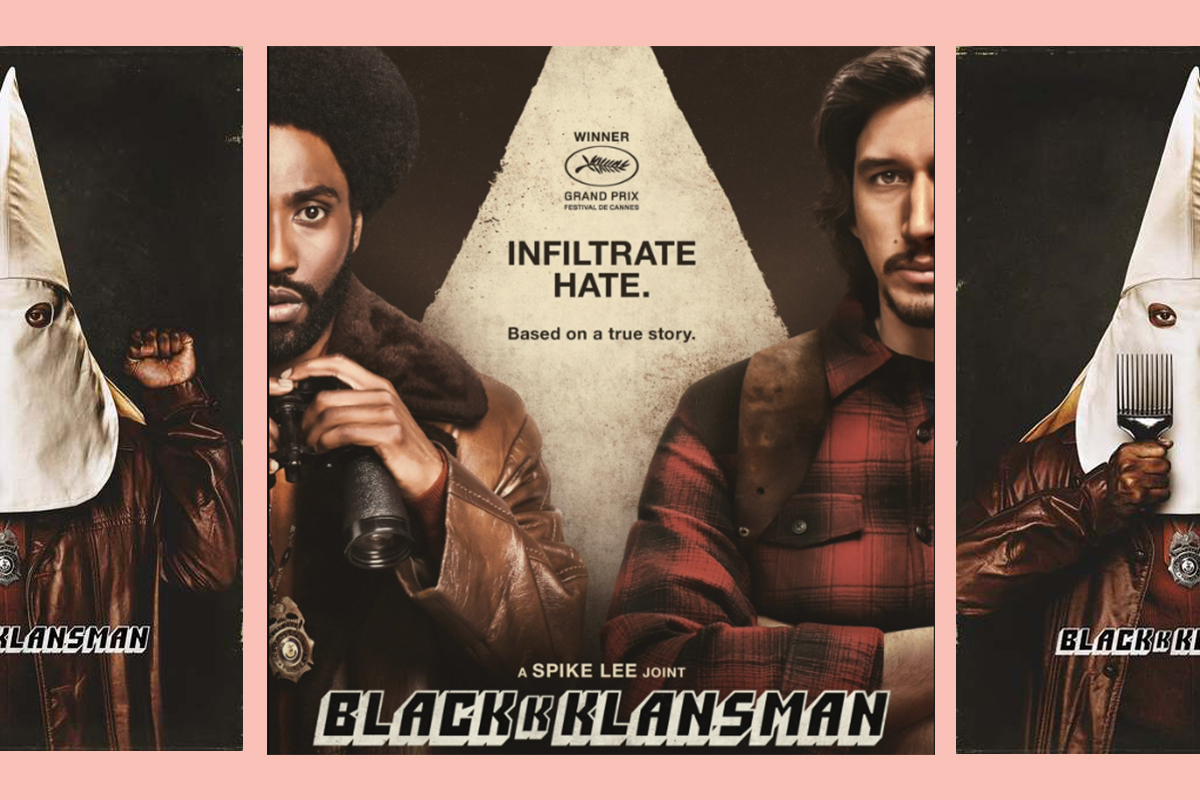About halfway through Spike Lee’s new film BlacKkKlansman, I pulled out my phone to write a line down. Adam Driver’s character, a Jewish cop named Flip Zimmerman, says “I never thought much about it” — “it” being his Jewishness —“now I’m thinking about it all the time.”
I couldn’t get that line out of my mind. As a white Jewish person, Flip’s journey to self-awareness in the face of overwhelming anti-Semitism resonates deeply for many Jewish Americans in 2018. The parallels to our current era is something Spike Lee is conscious of, and referential to, throughout the film.
Minor spoilers ahead.
Let’s back up for a second: BlacKkKlansman is the tale of Ron, a black cop (played by Denzel Washington’s son, John David Washington) who goes undercover to infiltrate the Ku Klux Klan, calling their hotline using his “white voice,” and eventually getting to speak to David Duke himself. When he’s invited to Klan meetings, he obviously can’t just show up. So a white cop, Flip (Adam Driver), who happens to be Jewish, becomes his body. The pairing of a black cop and a Jewish cop infiltrating the Klan seems like the set up for a dark buddy comedy. And while there were many laugh-out-loud moments, the film addressed its subjects with nuance and care.
After Flip attends a Klan meeting and returns to the police office for a debriefing, he tells Ron, “For you it’s a crusade, for me, it’s a job.” Yet, Ron tries to shake Flip into realizing that thwarting the Klan’s plan is also in his own best interest. “You have skin in the game, too!” he shouts at him. Flip, however, refuses to accept his “skin in the game.” For so long, he had identified as white, ignored his Jewish identity, and went through life completely fine. Until he is confronted with the Klan — who deeply, deeply hate Jews and deny the Holocaust happened — he refuses to accept his Judaism. Yet, after Flip is repeatedly threatened by an overeager Klan member who keeps calling him a Jew (suspecting he is Jewish because he kind of looks like one) and threatens him to take a “Jew lie detector test,” it finally hits home for Flip that he will never be white. Flip’s journey to Jewish self-acceptance in BlacKkKlansman is a powerful one.
This is not to say BlacKkKlansman is a film solely about Jews and anti-Semitism: it focuses, mainly, on the struggles of being black in America and the fight for black liberation. (Laura Harrier’s Patrice is particularly amazing.) However, what impressed me about the film — and something I was not expecting — was the acknowledgment of anti-Semitism at the heart of white supremacy.
During a particularly tense scene, a Klan member threatens to check Flip to see if he is circumcised, the fear is palpable. I sunk down in my seat, nervous Flip was about to be discovered as a member of the tribe (even though many non-Jews are circumcised) and prayed everything was going to be okay.
Flip later explains to Ron that he used to be just “another white kid.” He didn’t have a bar mitzvah. He didn’t think about his Jewishness. But now his Jewishness is something he can’t ignore — he can’t stop thinking about his heritage, the rituals, and everything. And as he’s confronted with the bigotry of the Klan, their disdain for black people and Jews, he feels self-conscious of his own Jewishness. And as his vulnerability grows, so does his own pride in his Jewish identity.
After I left the movie theater, I kept thinking about an essay I read last summer by Erik K. Ward about the role anti-semitism plays in White Supremacist ideology (aptly titled “Skin in the Game”). According to Ward, anti-Semitism forms the “theoretical core” of the emergence of white nationalist ideology in the 1960s and 1970s. This can be traced through the alt-right movement today; Ward argues that “anti-Semitism is not a sideshow to racism,” and should not be perceived as such, within the white supremacist movement. White supremacists view Jews as a separate race, and their “position as White folks in the U.S. represents the greatest trick the devil ever played.” Jews threaten whiteness, so goes the ideology, because they look white but they actually aren’t.
Anti-semitism and anti-blackness go hand in hand for white supremacists; ignoring one for the other is wrong. BlacKkKlansman understood this. It reminded its audience, time and time again, that as much as the Klan had a disdain for black Americans, their hatred for Jews is also there.
In an essay for Vulture, Abraham Riesman writes “BlacKkKlansman is one of the most profound and moving meditations on Jewish identity, responsibility, and survival in recent cinema.” He continues, “Resistance against white supremacy may not always feel like a distinctly personal concern if you’re a white Jew, because you don’t have the same casual hatred breathing down your neck every single day that a person of color does. That’s what makes Flip’s path so compelling. He is reminded that he is under threat, even if it’s a less obvious or enormous threat than those faced by more marginalized groups.”
Nowhere was this more clear in recent history than when the neo-Nazis marched in Charlottesville in August 2017. BlacKkKlansman, fittingly, ends with footage from that weekend. As they carried tiki torches and chanted “Jews will not replace us,” it was not difficult to draw the line from the film we just watched to the resurgence of the alt-right with the election of Trump.
BlacKkKlansman should be required viewing — especially on the anniversary of Charlottesville.



